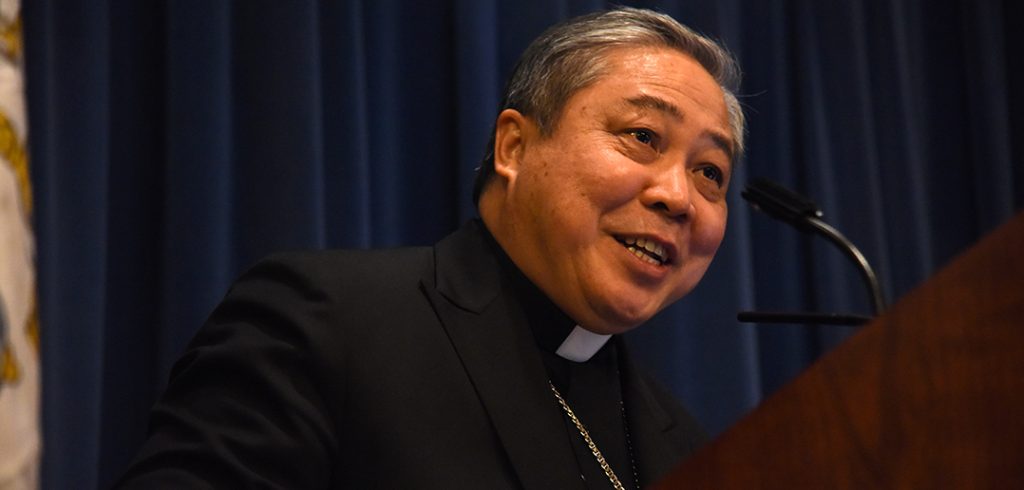Approximately 40 million people have fallen prey to human traffickers around the globe, and that number increases by nearly 3 million more every year, according to a Vatican diplomat serving at the United Nations.
“With tremendous advances in civilization through science and technology, it tempts us to think that slavery is a history long gone,” said Archbishop Benardito Auza, S.T.D, apostolic nuncio and permanent observer of the Holy See to the U.N. “But if you look at the facts you would see that this phenomenon is far from being a diminishing reality.”
The archbishop made the remarks on Feb. 23 at his installation as inaugural holder of Fordham’s Cassamarca Foundation Chair in Migration and Globalization in the Graduate Program in International Political Economy and Development (IPED). The renewable two-year appointment is intended to help Fordham to collaborate with the Holy See and the United Nations on issues of migration and globalization. The archbishop will deliver a spring lecture and hold a fall seminar. IPED students will also have the opportunity to intern at the Holy See Mission to the U.N.
Now serving as Pope Francis’ representative to the U.N., Archbishop Auza has been in the diplomatic service of the Holy See for more than 25 years. He said that human trafficking is being fed by many causes, but particularly poverty.
Just three weeks ago, he said, nine North Americans were arrested in Haiti for attempting to traffic 31 girls, aged 13 to 17. But while the girls were saved, many such victims have no home to return to. That’s because in some cases Haitian parents send their children off to brothels to work.
Recently, he said, nine young girls reported such a situation to the police. And although the girls’ parents were arrested, the brothels remained open for business.
“The reality is that no country is immune to human trafficking,” he said. “These two cases in Haiti are just the tip of iceberg.”
There is plenty of domestic trafficking right here in New York City, said Jayne Bigelsen, GSAS ’11, ’16, vice president of advocacy at Covenant House International and director of anti-human trafficking initiatives at Covenant House New York. She sat on a panel responding to the archbishop’s talk.
“Technically the people we serve are not trafficked, but in 2017 if your choice is to sleep on the street or have sex for a place to stay, then that’s a kind of trafficking,” said Bigelsen.
She said that most of Covenant House’s clients are ages 16 to 22—about the same age as undergraduates at Fordham.
“Pimps and traffickers are looking for young people—someone easy to exploit, someone who doesn’t have a family, someone easy to control, and someone who has never experienced love.”
Michael Osborn, a special agent with the FBI who once managed the bureau’s Child Exploitation Task Force, said that the public’s perception of those being trafficked can be part of the problem.
“If you’re on a highway and you drive by a prostitute, it’s just a ‘sinner,’” he said. “But if you slow down to 25 miles per hour, you might realize it’s a 12-year-old. If you stop, you realize she’s a victim.”
While the seriousness of domestic child trafficking through prostitution must not be understated, Archbishop Auza said that the horrors of international trafficking include sexual exploitation, harvesting of organs, and more.
“Human trafficking is a $32 billion illegal industry, third only to arms and drugs,” he said.
Most victims are forced into being trafficked, but some see it as the only option amidst the chaos of displacement, he said.
“People grab the blade of the sword because it’s better than grabbing nothing at all,” he said.
—
The event was sponsored by Centesimus Annus Pro Pontifice and the Cassamarca Foundation. A written summary of the archbishop’s presentation and the panel discussion will be sent to Rome for input at an international conference on human trafficking, to be held at the Vatican on May 18 to 20.

